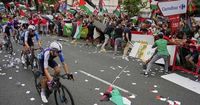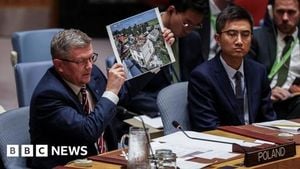The Spanish Vuelta cycling race, usually a showcase of athletic endurance and rural beauty, has this year become a flashpoint for international protest and diplomatic tension. As the 2025 edition of Spain’s iconic cycling event wound through the country’s bucolic backroads, the spectacle was repeatedly interrupted by anti-Israel demonstrations, with activists determined to draw global attention to the ongoing conflict in Gaza. The result? Five of the last ten days of racing were either cut short or disrupted, more than 20 protesters were detained, and the event’s final stages became a high-stakes convergence of sport, politics, and international outcry.
It all came to a head on September 11, 2025, during the 15th stage. Protesters waving Palestinian flags positioned themselves at the last turn before the finish line—right where TV cameras would pick up their message denouncing Israel’s military campaign in Gaza. According to AP and Arab News, one protester carrying a Palestinian flag got too close to the speeding peloton, causing two cyclists to crash. Neither was on the Israeli-owned team that has become the focal point of the protests, but the incident underscored just how tense the atmosphere had become.
Rosana Prieto, an alderperson from a small village in northwestern Spain, was among those who took to the roadside. “The protests were born from the idea that our only chance to defend human rights regarding Israel is the Spanish Vuelta,” Prieto told The Associated Press by phone. “It is an international spotlight for us to say that we are against what Israel is doing.” She later required medical treatment for abrasions after being dragged by police—a reminder that, even in peaceful protest, the risks are very real.
The backdrop to these demonstrations is Israel’s 23-month military campaign in Gaza, initiated after Hamas’ deadly attack on October 7, 2023. According to Gaza’s health ministry, the war has killed over 64,700 people, with famine now gripping the region’s largest city. The scale of the tragedy has resonated deeply in Spain, particularly among the country’s left-wing government and its supporters.
Spain’s leaders have not shied away from taking a stand. Prime Minister Pedro Sánchez recognized a Palestinian state in 2024, joining Ireland and Norway, and Spain became the first European nation to ask a UN court for permission to join South Africa’s case accusing Israel of genocide. During the Vuelta, Sánchez went further—publicly denouncing Israel’s actions as “genocide,” announcing an arms embargo, and blocking Israel-bound fuel deliveries from passing through Spanish ports. The diplomatic backlash was swift: ministers from both Spain and Israel were banned from visiting each other’s countries, and Israeli leaders labeled the Spanish government’s actions as “antisemitic” and a “blatant genocidal threat.”
For many protesters, the Vuelta offered a unique platform. The race, which covers over 3,100 kilometers (1,900 miles) through rural Spain, is broadcast internationally, providing a rare opportunity for grassroots activists to be seen and heard. As Prieto put it, “It is an international spotlight for us to say that we are against what Israel is doing.”
But the demonstrations didn’t just make headlines—they had a tangible impact on the race. Protesters blocked roads, jumped out of cover to confront riders, and, according to UAE Emirates team boss Joxean Fernández Matxin, even hit cyclists with flag poles and threw tacks onto the course. The chaos led to five days of racing being cut short or interrupted, and prompted the peloton to vote that they would quit the event if their safety was threatened again. “Everyone has a right to protest, but it’s a shame that it has to happen here and in this way and that we can’t finish the race,” said race leader Jonas Vingegaard, a two-time Tour de France winner, after a stage finish was shortened.
The Israeli-owned team, Israel Premier Tech, found itself at the center of the storm. The team, which has only one Israeli rider in this year’s Vuelta, tried to keep a low profile—removing its name from uniforms midrace and avoiding media interviews. But quitting the race, the team said, was out of the question: “It would set a dangerous precedent.” Team owner Sylvan Adams, an Israeli-Canadian businessman who emigrated to Israel in 2016 and helped bring the Giro d’Italia’s start to Israel in 2018, received praise from Israeli Prime Minister Benjamin Netanyahu. “Great job to Sylvan and Israel’s cycling team for not giving in to hate and intimidation,” Netanyahu posted on September 5. “You make Israel proud!”
Spain’s government, meanwhile, has made its position clear. Foreign Minister José Manuel Albares publicly supported expelling Israel Premier Tech from the Vuelta, and government spokesperson Pilar Alegría, who also serves as sports and education minister, declared, “Neutrality is no longer possible in the face of the death and destruction in Gaza.” She added on Cadena Ser radio, “Sports cannot be isolated from the world that surrounds them.” The protesters, for their part, argue that if Russian teams were banned from international sporting events over the war in Ukraine, Israeli teams should face similar consequences.
The protests have already begun to ripple beyond Spain. Tour de France champion Tadej Pogačar, who skipped the Vuelta, expressed concern that such disruptions could spread to other races. “I think all the riders are a little scared of what could happen,” Pogačar told reporters in Quebec on September 12. “When we see what’s going on at the Vuelta, we talk about it and we think it could happen here or in other races between now and the end of the season.” Sure enough, a day later, a few dozen protesters gathered in Quebec during a one-day race in which Pogačar was competing.
The international ramifications extend even further. During the Vuelta, a fleet of activist ships set sail from Barcelona carrying humanitarian aid, aiming to break Israel’s naval blockade of Gaza. The European Commission’s president called for suspending trade ties with Israel, and the Netherlands threatened to boycott the Eurovision song contest if Israel is allowed to participate in 2026.
As the Vuelta heads to its final stage in Madrid, authorities have ramped up security, deploying 1,500 police officers—on top of the 130 already accompanying the race. Protesters have vowed to take action again, determined to keep the world’s attention focused on Gaza, even as the cycling world and international diplomacy collide on Spanish soil.
With passions running high and the eyes of the world on Madrid, the Vuelta’s closing moments promise to be about far more than just who crosses the finish line first.




